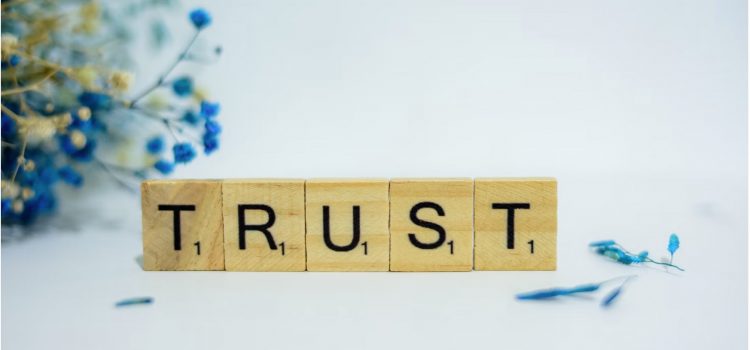

This article gives you a glimpse of what you can learn with Shortform. Shortform has the world’s best guides to 1000+ nonfiction books, plus other resources to help you accelerate your learning.
Want to learn faster and get smarter? Sign up for a free trial here .
Why is trust so important in relationships? How is trust earned? What does it take to destroy trust?
Trust sets the tone of every interpersonal interaction. Trust is earned gradually but can be destroyed in an instant. Therefore, you should make maintaining trust your top priority in all your relationships, personal and professional.
Learn how trust works, why it’s important, and how to build it with others and yourself.
The Psychology of Trust
According to Judith Glaser, the author of Conversational Intelligence, feelings of trust and distrust have neurological roots and evolved as a survival mechanism, which demonstrates how important trust is to our interactions. Let’s look at what happens in the brain when you engage in conversation with someone you distrust versus someone you trust:
Every time you meet someone new, your brain must decide if they’re an ally or an enemy. This is because, from an evolutionary perspective, you need to know if the person wants to harm you, and you therefore need to flee or defend yourself. If your brain decides the other person is an enemy, it goes on the defensive: The amygdala (where fear is processed) is activated, cortisol (the stress hormone) is released, and you’re not able to trust the other person.
On the other hand, if you decide the other person is an ally, your brain releases oxytocin, a neurotransmitter that makes you feel connected to others. Your brain also releases happiness hormones like dopamine and serotonin. These hormones help you feel that you can trust the other person.
How to Earn Someone’s Trust
Trust can’t be bought with grand gestures and sweet words. Trust is earned gradually over time. Here are three ways to earn someone’s trust:
1. Express Vulnerability
In her book The Power of Vulnerability, Brené Brown explains that trust isn’t possible without vulnerability between two parties. It is nearly impossible to trust another person if you have no concept of their motives, personality, or feelings. Therefore, to earn someone’s trust, you have to be willing to be vulnerable. Sharing small moments of love, affection, or empathy will help develop a stronger bond with the people around you over time.
Trust takes a long time to build, but only a moment to destroy. In terms of vulnerability, there are two primary causes of the destruction of trust:
- Betrayal, or using someone’s vulnerability against them.
- Disengagement, or no longer showing interest in someone’s vulnerability.
| False Sincerity In The 48 Laws of Power, Robert Green explains how to manipulate someone into trusting you using false sincerity: People are likely to mistake it for honesty, because they trust appearances and want to believe others are honest. To make it even more effective, publicly stress the importance of being honest as a social value. Underscore your supposed honesty by revealing something seemingly personal (but fake or irrelevant) once in a while. |
TITLE: The Power Of Vulnerability
AUTHOR: Brené Brown
TIME: 28
READS: 77.6
IMG_URL: https://www.shortform.com/blog/wp-content/uploads/2021/05/the-power-of-vulnerability-cover.png
BOOK_SUMMARYURL: the-power-of-vulnerability-summary-brené-brown
AMZN_ID: XYZ
2. Keep Your Promises
When you consistently follow through with your promises and commitments, you earn trust and set an example for other people. For example, if you tell your employees that you plan to give a holiday bonus and follow through, employees learn that they can trust you to be true to your word.
That said, there will be times when you will fall short of your commitments. When that happens, it’s important to take ownership of the outcomes that you were responsible for rather than placing blame on others.
TITLE: The Success Principles
AUTHOR: Jack Canfield
TIME: 90
READS: 118.1
IMG_URL: https://www.shortform.com/blog/wp-content/uploads/2020/11/the-success-principles-cover.png
BOOK_SUMMARYURL: the-success-principles-summary-jack-canfield
AMZN_ID: XYZ
3. Communicate Your Expectations
Even if we go above and beyond in earning someone’s trust, there will always be times when a lack of trust arises in our relationships. People usually blame each other for a lack of trust. However, according to Greg McKeown, the author of Effortless, lack of trust is usually down to the structure of a relationship. When people have different expectations for a relationship, their goals don’t match, or their roles aren’t clearly defined, the relationship can become distrustful.
To avoid this breakdown, build a strong foundation of trust from the beginning.This can just mean being open and upfront about how you feel and what you want and expect from the person.
Building Self-Trust
If you want other people to trust you, you first need to trust yourself. In his book The Speed of Trust, Stephen M.R. Covey writes that self-trust is a function of harmony between your principles, your motives, your capabilities, and your track record. Essentially, self-trust comes from behaving in a way that reflects your values. Any dissonance between the person you want to be and your behavior can erode your self-trust.
For example, say you have a foundational belief that you are a kind person, but you find yourself berating your employees and being rude around the office. Since your behavior doesn’t reflect your values, you might start to question whether you are in fact, a kind person, and your self-confidence may be shaken.
To build self-trust, Covey suggests conducting an honest inventory of your nature and your proficiency. Once you know who you want to be and identify where your actions deviate from your personal mission and values, you can make a commitment to yourself to work on those areas. The more you keep these promises to yourself and the more alignment you see between your nature and proficiency, the more you will trust yourself.
TITLE: The Speed of Trust
AUTHOR: Stephen M. R. Covey
TIME: 17
READS: 20.2
IMG_URL: https://www.shortform.com/blog/wp-content/uploads/2020/11/the-speed-of-trust-cover.png
BOOK_SUMMARYURL: the-speed-of-trust-summary-stephen-m-r-covey
AMZN_ID: XYZ
Final Words
Trust is a critical yet undervalued prerequisite for success in the modern world. Trust deepens relationships, creates opportunities, and improves the efficiency of interpersonal interactions.
If you enjoyed our article about how trust is earned, check out the following suggestions for further reading:
4 Essential Keys to Effective Communication
Two of the most common communication faux pas are the failure to effectively listen and the failure to adequately express yourself to others. These issues result in misunderstandings, hurt feelings, and the inability to resolve problems.
In 4 Essential Keys to Effective Communication, Bento C. Leal argues that these communication errors are the most damaging to relationships. However, he claims you can avoid these mistakes and their negative outcomes by learning how to integrate empathy into every step of the communication process.

Want to fast-track your learning? With Shortform, you’ll gain insights you won't find anywhere else .
Here's what you’ll get when you sign up for Shortform :
- Complicated ideas explained in simple and concise ways
- Smart analysis that connects what you’re reading to other key concepts
- Writing with zero fluff because we know how important your time is






